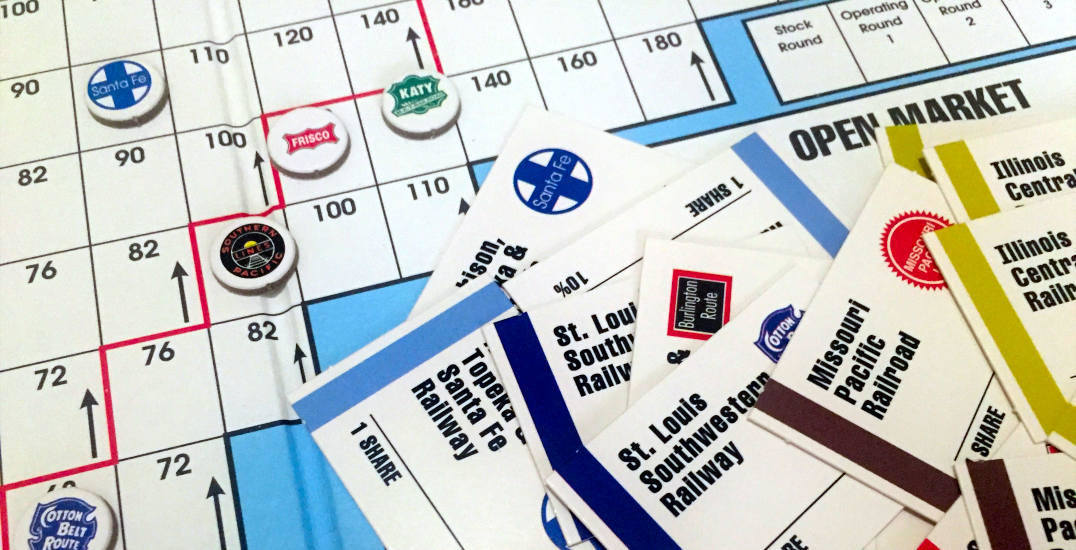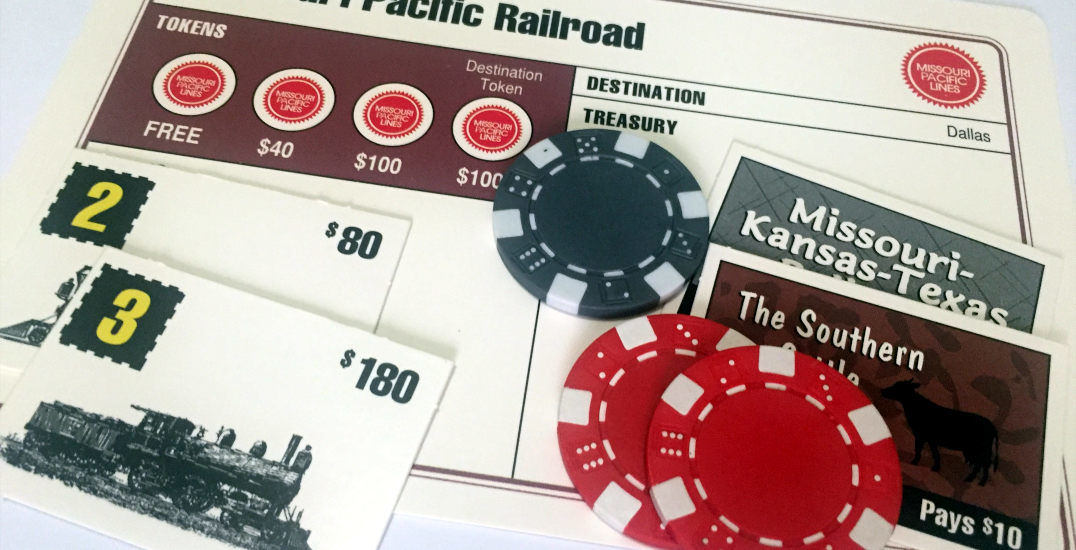
The 18XX series has a reputation of being some of the most difficult board games you can play. Fortunately, it’s not true. Like all games by Francis Tresham, the rules are extremely simple. The difficult lies, not in understanding how to play, but in knowing what to do and how to use the tools provided by the game to your advantage.
In this guide, I’ll explain how to approach the series as a beginner and how to tackle its challenges part by part.
THE AUCTION
Most 18XX games start with an auction. This is a bit of a shame, because it’s the series at its least intuitive. In it, you are given the chance to buy a series of private companies or “privates” that offer railroads some sort of advantage and a steady bit of income for you as their owner.
The purpose of this setup is to give players different positions from each other. Think of it like picking a faction in an asymmetrical game except you bid for the opportunity instead of choosing the one you like. The advantage of using an auction is the lack of randomness and that, if one of the “powers” is better than the designer thought, you can just pay more for it.
Don’t give much attention to what each of the privates being auctioned do. As a rule of thumb, their powers aren’t worth much and often go unused. Focus on their value: The higher the cost of a private, the more money you can make by raiding one of your companies, but the less money you’ll have at the start. Keep in mind that shares are a pretty generous bonus, so don’t be afraid to bid more for privates that offer them.

Try to get at least one item, avoid getting two expensive ones and don’t let other players get them for too cheap. A 10% to 20% extra is a good rule. Normally, I don’t try to end the auction by taking the top item unless I’m sure all other players will pay a fair share.
It’s a good idea to keep enough money in hand to “float” a company in the first stock round. Strictly speaking, it’s not necessary and, often, the game will be designed to prevent you from doing so. But it’s a good baseline to keep in mind. In order to float a company you’ll need to buy 6 shares at the lowest possible par price.
CREATING A RAILROAD
Becoming the director of a railroad gives you control over the way the game develops, what trains are bought, which areas of the map are built on and which companies flounder or flourish. It’s also fun and makes for a better learning experience. This is why floating a company and controlling it makes a good early goal.
Depending on the game and the initial auction you might not be able to open a company on your own. That’s fine. Playing investor for a while is good. After all, as long as the person in charge takes the same actions you would take, it doesn’t matter if you don’t call the shots.
In most games you’ll be asked to set a “par price” for your company. This is the cost of shares in that company and also determines how much money it will receive in its coffers. Since lower par prices offer a better return on investment, just set it to the lowest. You can set future companies at higher values to support the cost of large trains.

There is one exception: If you bought the president’s certificate in the initial auction, like the Baltimore & Ohio in 1830, set the price to the highest value. After all, if you paid 200$ for two shares a lower price will reduce the value of your purchase.
When it’s time to build, try to connect to nearby cities as soon as possible. Buy at least two trains and always pay out dividends. As a rule of thumb, one train is far too little and three is a bit too much. Ultimately, if you are running one train and your opponent is running three, he’s making much more money than you.
TRASH STOCKS
Buy a share in a company you don’t control, then sell it. Congratulations! You have manipulated the market. Buying and selling reduces the value of shares and, hence, harms those who bought them before you. Aggressive stock-trashing will see companies that started at 100$ reduced to 67$ or even lower, punishing your rivals.
Stock-trashing is a vital part of 18XX. While mean and gratuitous at first glance, it’s an important check to the power of holding new companies. Without proper thrashing, investing is painless. Don’t let other players get away without consequences.
Now, there are drawbacks to stock-trashing. You make shares cheaper for others and miss out in investment opportunities. Eventually, companies will reach a point in which trashing barely affects their price. Even worse, they may sell out and become untouchable. But most new players don’t trash enough stock. If you are new, learn to trash stocks, it’s easy and vital to good play.

Most importantly, trashing stock also lets you change the order by which companies operate. Making one company operate earlier or later can allow you to reach an important destination or grab a good train before anyone else does. This is especially important when two or more companies float at the same time. Which one do you want to grab trains first?
RAID YOUR COMPANY
Remember those privates you got on the initial auction? Starting with the sale of the first 3-train, companies can buy them at an inflated price. This move, inspired by the real-life Crédit Mobilier scandal, will give you a massive influx of capital at the cost of tanking the company.
It should go without saying that you want to fill your pockets as quickly as possible.The earlier you embezzle company assets, the more time your ill-earned gains will have to pay off. Remember, the game’s companies are just a tool. Once you have successfully raided a company, you can “donate” it to someone else and have them face the consequences.
Either way, raiding the company is the safe play both for you and your companies. A richer player can buy more shares and help companies support each other better than one who is poor. In fact, the standard strategy in the 1830 branch is to raid your first company and then save it with the funds from your second.
Since companies can buy privates at any point during their turn, even after buying the first 3-train themselves, controlling the timing of that purchase is important. Ideally, you want to be the only player on the table able to raid or, at least, not be left behind for a whole round.

The nuances around privates are difficult and I wouldn’t worry too much as a novice. My rule of thumb is that if someone manages to cash out on their privates on the first operating round, someone made a mistake. But you are learning so don’t worry too much about it.
PUSH THE TRAINS!
At some point you’ll find yourself losing. For whatever reason someone is making more money than you and they’ll run away with the game if you don’t do something to stop them. Fortunately, there’s an easy way to do it: Buy more trains.
Buying more trains ensures their older, profitable engines will rust. It’s perfectly acceptable to buy more trains than you’ll ever need just to make sure everyone else’s will be gone from play. It’s even usual to float new companies just to rust other player’s trains faster.
Lastly, buying trains prevents the game from dragging on. Since newbies can’t run railroads very efficiently and aren’t skilled enough to engineer a bankruptcy, you may end up playing for longer than it’s reasonable. Don’t be afraid to tally scores and discuss what you’ve learned.
After all, those small upgrades at the end of the game won’t affect the result. These are not games won by ten dollars or even a hundred. Once the last permanent train is out and all station tokens have been placed, simply run the numbers and determine who wins. Tacking an additional 30 minutes to clean things up isn’t worth it, especially since you’ll be tired from a long, grueling match. Like always, the result of the first game doesn’t matter. What matters is being able to try again with the perspective it has given us.




this is fantastic. thanks so much
Glad you found it useful! 🙂
“Once you have successfully raided a company, you can “donate” it to someone else and have them face the consequences.”
By the time I raid a company, I usually feel like it has still a lot of dividends and share appreciation in it, so immediately dumping it doesn’t seem appealing to me. Maybe that’s just a symptom of 18Chesapeake being too nice, I don’t know.
Remember, you can raid the trains as well! Selling several shares will also drop the share value by a big margin, so that helps as well.